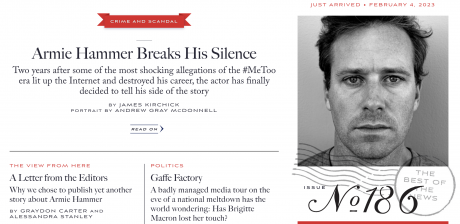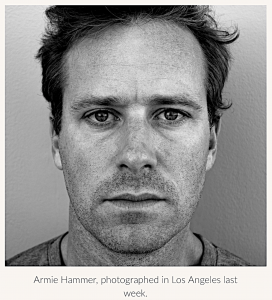For the first time since he was branded as a sexual cannibal-animal and wham-banished from the film business, Armie Hammer has presented his side of the story.
Ignore the Variety summary by Elizabeth Wagmeister because the Air Mail piece is about a lot more than just about the usual contrition and spin (i.e., “I was bad, and now forgive me”). What Hammer contends and what he offers in terms of compelling evidence is highly persuasive.
I’m not going to summarize the main points of James Kirchick’s 2.4 Air Mail article as anyone can read it (it’s not paywalled), but there’s no question that anyone with an open mind will emerge with their previous impressions strongly challenged.
I read the article this morning, and many of the accusations against Hammer look kinda flimsy now, I can tell you that.
At the very least readers will conclude that Kirchik’s piece has downgraded Armie’s status from that of an alleged monster and ruthless rapist-carnivore to the much less odious label of admitted former asshole (an asshole in recovery, I mean) who knows where the BDSM attraction came from (i.e., sexual abuse as a powerless youth).
The article claims that Hammer’s primary sin was using his power as a rich, famous actor in his 30s (“power imbalance” being a major #MeToo felony these days) to sexually overwhelm various younger women and then (this is what really got him in trouble) ghosting them when he decided to abruptly or whimsically end the affairs like that.
Which is similar to what what Ansel Elgort was lynched for also — ghosting the of-legal-aged “Gabby” after being intimate with her a couple of times.
Message to everyone: “Ghosting” a lover really hurts and often leads to revenge moves. If you want to move on, save yourself a lot of trouble by conveying this in some kind of half-considerate way.

We all agree that ignoring a safe word is an awful thing to do, and this charge hasn’t been specifically addressed in the article (or maybe I read it too fast) but the sexual behavior of Armie and the various women who participated, so to speak, is addressed and explained. Hammer raped no one, he says — it was all a consensual game with rules and a particular script laid out in advance.
Hammer seems to be mainly guilty of behaving like a sexual obsessive. He certainly didn’t chew on anyone’s rib or cut off a woman’s toe and put it in his pocket….none of that crazy stuff.
Excerpt #1: “The Hammer case raises questions about the media. Virtually without exception, the press has treated the accusations from Hammer’s professed victims, no matter how fantastical, with utter credulity. As recently as last October, for instance, a story in New York magazine claimed that Hammer stands accused of ‘possible cannibalism.'”
Excerpt #2: “One prominent Hollywood figure has decided to speak out unreservedly in Hammer’s defense. ‘I found him to be so polite and so well mannered and so nice and so funny and so real,” says Howard Rosenman, the veteran producer of Call Me by Your Name. ‘And don’t forget, I spent time with him a lot, both in Crema and on the road, when we were on the Oscar trail. So all of [the allegations are] just pure bullshit, and yes, he deserves a second chance.’
“Rosenman, who is gay and has been involved in some of Hollywood’s most important gay-themed films (The Celluloid Closet, Common Threads: Stories from the Quilt, Milk), sympathizes with Hammer as someone whose sexuality was once considered taboo. ‘It’s been puritanical,” Rosenman says of the media’s prurient coverage. ‘The kink-shaming is just awful. I, as a gay man who had sex for many, many years with many different kinds of people, understand this better than anyone.”
“In a recent podcast interview, Luca Guadagnino said that he ‘cannot wait to work with Armie as soon as I have a great role for [him].'”
Excerpt #3: “When I ask [Hammer] if he takes inspiration from his mentor Robert Downey Jr., who was arrested multiple times in the late 1990s on drug charges and spent several spells in jail, his answer turns toward the mythological: ‘What I would say is this: There’s examples of people who went through really difficult times and experienced what [the author] Joseph Campbell would call ‘the hero’s death.’ And the hero must die so the hero can be reborn again.’
“There are examples everywhere, Robert being one of them, of people who went through those things and found redemption through a new path. And that, I feel like, is what’s missing in this cancel-culture, woke-mob business. The minute anyone does anything wrong, they’re thrown away. There’s no chance for rehabilitation. There’s no chance for redemption. Someone makes a mistake, and we throw them away like a broken disposable camera. Robert and others are examples of what it looks like for a human being to experience pain and then growth. And that aspect of it is something that I aspire to.’
“Given the depth of his fall, if Hammer does make a comeback, it would qualify as one of the more dramatic in show-business history. The possibility can’t be written off entirely; there are few things Hollywood loves more than a good redemption story. But for now, Hammer says, he just wants to set the record straight. It’s a mission that he frames as a test for the industry, and for society at large, with implications reaching far beyond that of his own individual fate.
Excerpt #4: Hammer: “No one will hire me. No one will insure me. I can’t get bonded for a project…nothing,” he says. “And no one will touch me because if they hire me, then they are the people who support abusers. And then they’re liable to get canceled themselves because this fire that is burning itself through town — when they throw someone like me on the fire to protect themselves, what they don’t realize is happening is all they’re doing is making the fire bigger. And that fire is now out of control and it’s going to burn everyone. And they’re just continually throwing people on it as sacrifices to protect themselves.”

